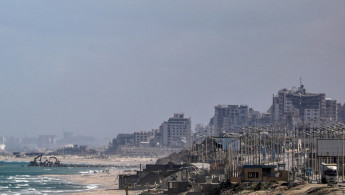Two children die in Gaza's high temperatures as 1.2 million people living in tents under threat
High temperatures are bringing further danger to Gaza's suffering population following reports that two children died from overheating in tents as temperatures reached 40 degrees Celsius this week.
Some 1.2 million Palestinians are currently sheltering in plastic tents in and around the southern city of Rafah and are facing dire living conditions with shortages of clean water and access to bathing and toilet facilities.
The head of UN Palestinian Refugee Agency, Phillipe Lazzarini said on Friday that at least two children had died from heat.
"Over the past few days, Gaza has been undergoing an unusual heatwave," Lazzarini wrote in a post on social media site X.
"We received reports that at least two children died due to the heat. What more to endure: death, hunger, disease, displacement, and now living in greenhouses-like structures under scorching heat."
A five month old girl died on 25 April due to the high temperatures, the UN's Office for Coordination of Humanitarian Affairs (OCHA) reported. Some 14,000 children in Gaza have been killed in nearly seven months of war, according to Gaza's health authorities.
UN agencies have said that most families are living in rudimentary structures made of scraps and plastic sheets which are unsuitable for habitation.
Stéphane Dujarric, spokesperson for the UN Secretary-General said on Thursday that the lack of access to fresh water is posing "a growing threat to public health" as the temperatures rise.
🚨A 5-month-old baby, Malak al-Yazji, just baked to death in a refugee tent as temperatures soar to 40C/104F. Those tents are turning into baking oven
— Muhammad Shehada (@muhammadshehad2) April 25, 2024
Israel is about to displace over 1 million Gazans in Rafah to a tent city with zero infrastructure & diseases spreading rapidly! pic.twitter.com/oDXV8Addbu
Gaza's Mediterranean climate brings hot weather usually from around May to October, with high levels of humidity and temperatures reaching up to 38 degrees in August.
It is set to bring further misery for Gaza's population, and aid officials fear it will exacerbate sickness, which is on the rise.
Gaza's government office warned last week that rubbish and sewage is flooding streets and is creating a breeding ground for the spread of disease with increasing cases of diarrhoea and Hepatitis A.
At the start of the war in October, Israel imposed a total siege on Gaza, blocking food, water, and fuel supplies into the impoverished territory.
As a result, the population is dependent on humanitarian organisations and aid supplies coming into the territory, but this has been severely restricted by Israel.
Relentless Israeli attacks on hospitals and health workers have plunged Gaza into a major health crisis, while medical supplies have been restricted.
One Palestinian man who was displaced from Gaza City, Mustafa Raswan, said in an interview with UNRWA that living in a tent in the heat was like being inside "a greenhouse".
He said the tents suffered flooding during the winter months and now the heat means "no one can tolerate living inside".
"Everything is a queue, everything is suffering in displacement," Raswan said in a video posted on UNWRA's X page.
Over the past few days, #Gaza has been undergoing an unusual heatwave. This made the already inhumane living conditions even worse for 1.5 million people, mostly living under plastic sheets in #Rafah.
— Philippe Lazzarini (@UNLazzarini) April 26, 2024
We received reports that at least two children died due to the heat.
What… https://t.co/vY9sEd4jae
Displaced Palestinians spend hours each day waiting to collect food, fill up cartons for water or use makeshift latrines.
At around 25 square miles and an average of 22,200 people per square kilometre, Rafah is hosting five times its pre-war population. Hundreds of thousands have been forced to escape bombing in the north and centre of the strip as Israel's forces have decimated residential buildings over the past six months.
Now the Rafah governorate - once designated a "safe zone" by the Israeli military in December - is facing imminent ground invasion by Israeli forces.
There are fears that the attack, which Israel is believed to be preparing, could begin in the coming days, despite international concerns that an invasion could bring mass civilian casualties.
Aid agencies have also said evacuating the thousands of civilians out of Rafah – as Israel has suggested – would be extremely challenging given that the war has turned swathes of the territory into rubble.
There are huge numbers numbers of injured and sick people who need to be evacuated in order to receive treatment. The UN said on Thursday that only 54 percent of patients in need of medical evacuations had requests approved by Israel.




 Follow the Middle East's top stories in English at The New Arab on Google News
Follow the Middle East's top stories in English at The New Arab on Google News


